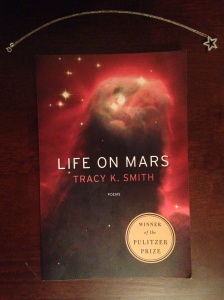I am always thrilled when science and art (particularly writing) can come together in one beautiful project. It’s one of the reasons why I love Carl Sagan’s Cosmos series so much (and why some of my favorite moments from The West Wing involve impassioned, poetic speeches about the space program). It’s also why I was immediately drawn to Tracy K. Smith’s Pulitzer Prize-winning poetry collection, Life on Mars, published by Graywolf Press. Smith navigates the space between–or perhaps within and among–art and science expertly, crafting what has become possibly my favorite book of poetry.
 The main endeavor of this book is to serve as an elegy for Smith’s late father, and in this aim, it confronts a myriad of uncertainties with the concrete, scientific realities of our world. (Also, a warning: this review is about to address some hard topics.) Smith seems to be using scientific symbols and objects to address the idea of mortality, a concept that is both the most certain and uncertain part of our existence. As such, this book plays with an interesting paradox, creating an idea of a God (of sorts–I would call this book more “spiritual” than “religious”) that exists within the scientific universe, rather than opposed to it. This book seems to be constantly playing with paradoxes. It often juxtaposes images of Earth (ice, stones, the ocean) with those of outer space, but it also links them together within its metaphors. It gives a similar paradoxical treatment of the body, examining it as both an earthly tether and its own universe.
The main endeavor of this book is to serve as an elegy for Smith’s late father, and in this aim, it confronts a myriad of uncertainties with the concrete, scientific realities of our world. (Also, a warning: this review is about to address some hard topics.) Smith seems to be using scientific symbols and objects to address the idea of mortality, a concept that is both the most certain and uncertain part of our existence. As such, this book plays with an interesting paradox, creating an idea of a God (of sorts–I would call this book more “spiritual” than “religious”) that exists within the scientific universe, rather than opposed to it. This book seems to be constantly playing with paradoxes. It often juxtaposes images of Earth (ice, stones, the ocean) with those of outer space, but it also links them together within its metaphors. It gives a similar paradoxical treatment of the body, examining it as both an earthly tether and its own universe.
Despite the heavy topics of this collection, it never veers too far into melancholy. It uses the uncertainty of the afterlife, combined with the wonders of the universe that we do know about, to create a sense of hope. The poem that could probably serve as the thesis statement of the collection is “The Speed of Belief,” a long poem dedicated to Smith’s father. This poem contains perhaps the central conflict and question of the collection: “My father won’t lie still, though his legs are buried in trousers and socks. / But where does all he knew–and all he must now know–walk?” My favorite poem of the collection, however, is one called “The Universe as Primal Scream.” It starts with something mundane: the speaker awakening to the sounds of her upstairs neighbor’s children crying. Smith takes this basic symbol of want, along with other mundane elements of the speaker’s home, to meditate on the fragile line between daily life and the unknown of where we came from and where we’re headed. As the speaker muses, “I’m ready / To meet what refuses to let us keep anything / For long.”
Life on Mars is full of wonder and sadness, the vastness of the universe and the minutiae of our daily life. If you’re new to poetry, this is a beautiful introduction. If you’re already a poetry fan, you’ll appreciate Smith’s original use of scientific symbols to confront some of life’s biggest questions. This collection made Tracy K. Smith one of my favorite poets, and I can’t wait to read more of her.

This is such strong line: “My father won’t lie still, though his legs are buried in trousers and socks.” Thanks for the review!
LikeLike
Thank you, glad you enjoyed!
LikeLike